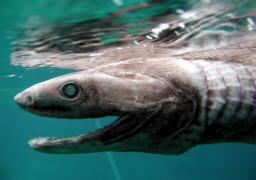Hundreds of fossilised teeth of a small shark-like creature have been found in the clay soil of the Chianti winegrowing country in Tuscany.
The discovery, published in the international journal Cainozoic Research, ''sheds new light on the history of Italy's geology in the middle Pliocene Era,'' about three million years ago, said discoverers Simone Casati and Marco Zanaga.
They said the teeth provided evidence that the area, then a sea bed, was not level but alternated ''coastal areas with shelves and trenches''.
Two ancient whales were found in the area two years ago.
In the second find, shark teeth were found among the whale's bones, ''probably left in the ancient mammal's flesh when the predator attacked just before it died,'' researchers said.
The two 10m (33ft) whales, said to be five million years old, were in an excellent state of preservation and were taken to Florence's Natural History Museum.
Makers of the famous local wine Brunello di Montalcino latched onto the find as ''evidence of the specially rich soil that makes our wine so special''.
The newly discovered shark, about 1.5m (5ft) long, is set to join its larger and older companions.














